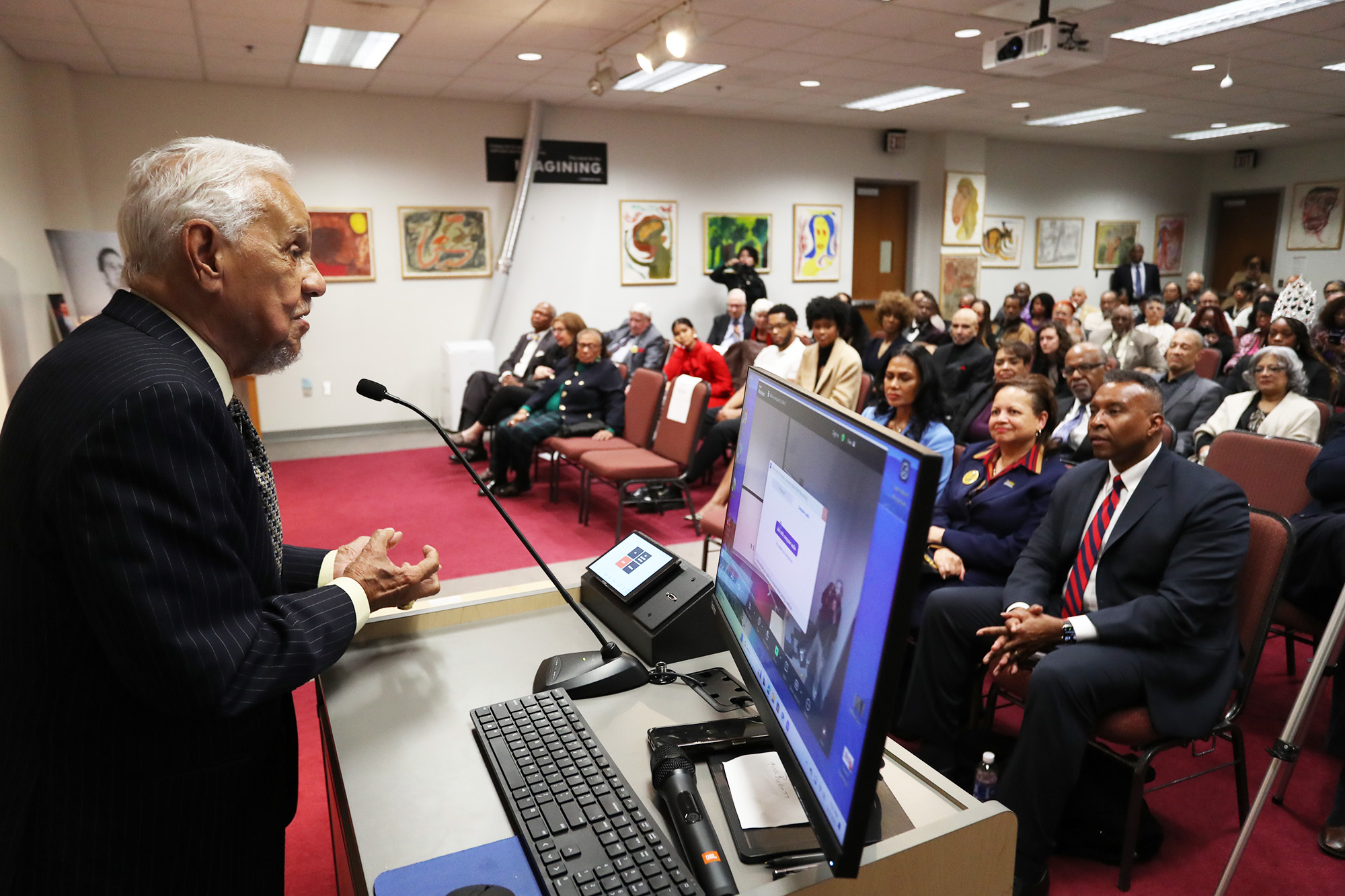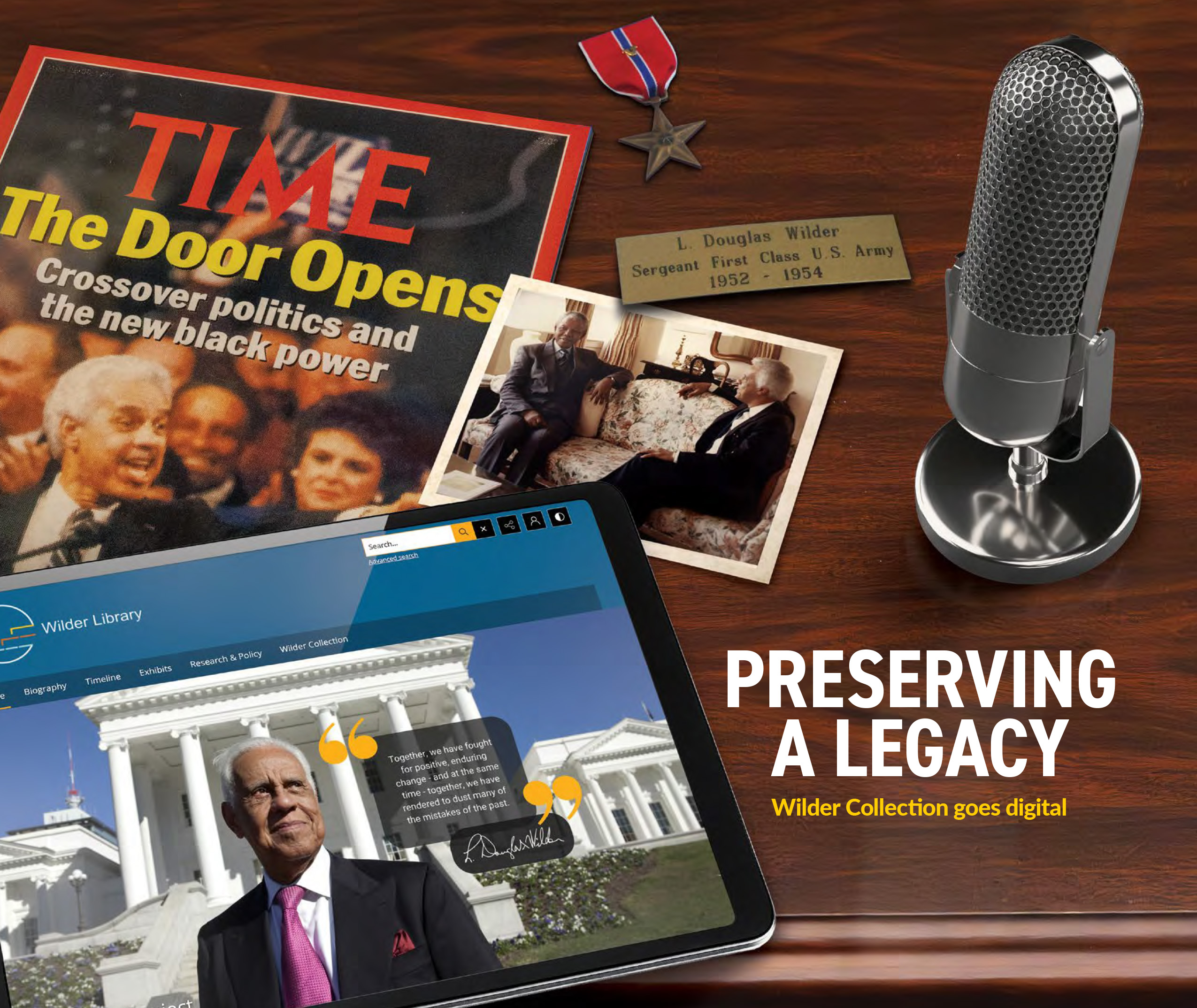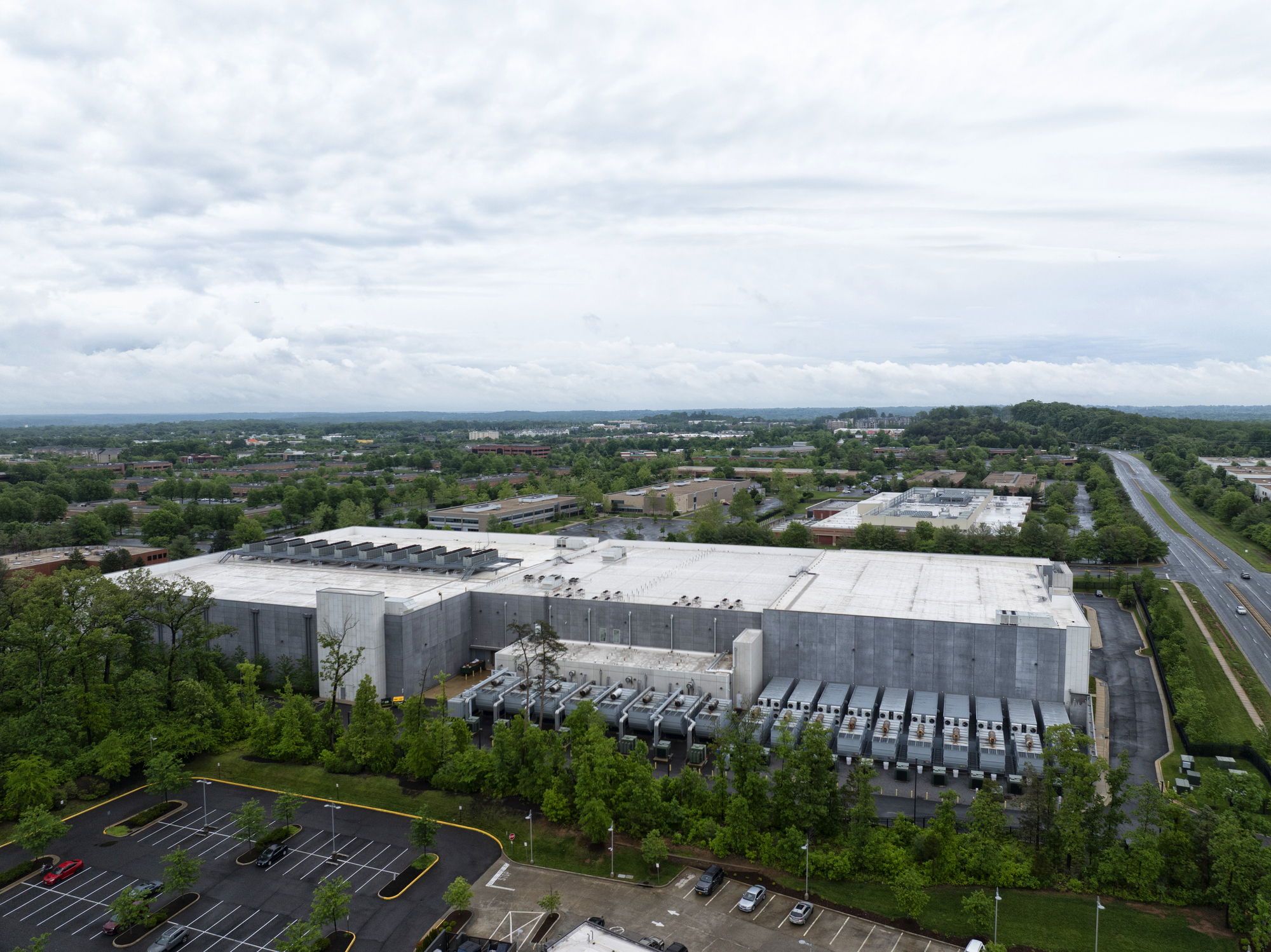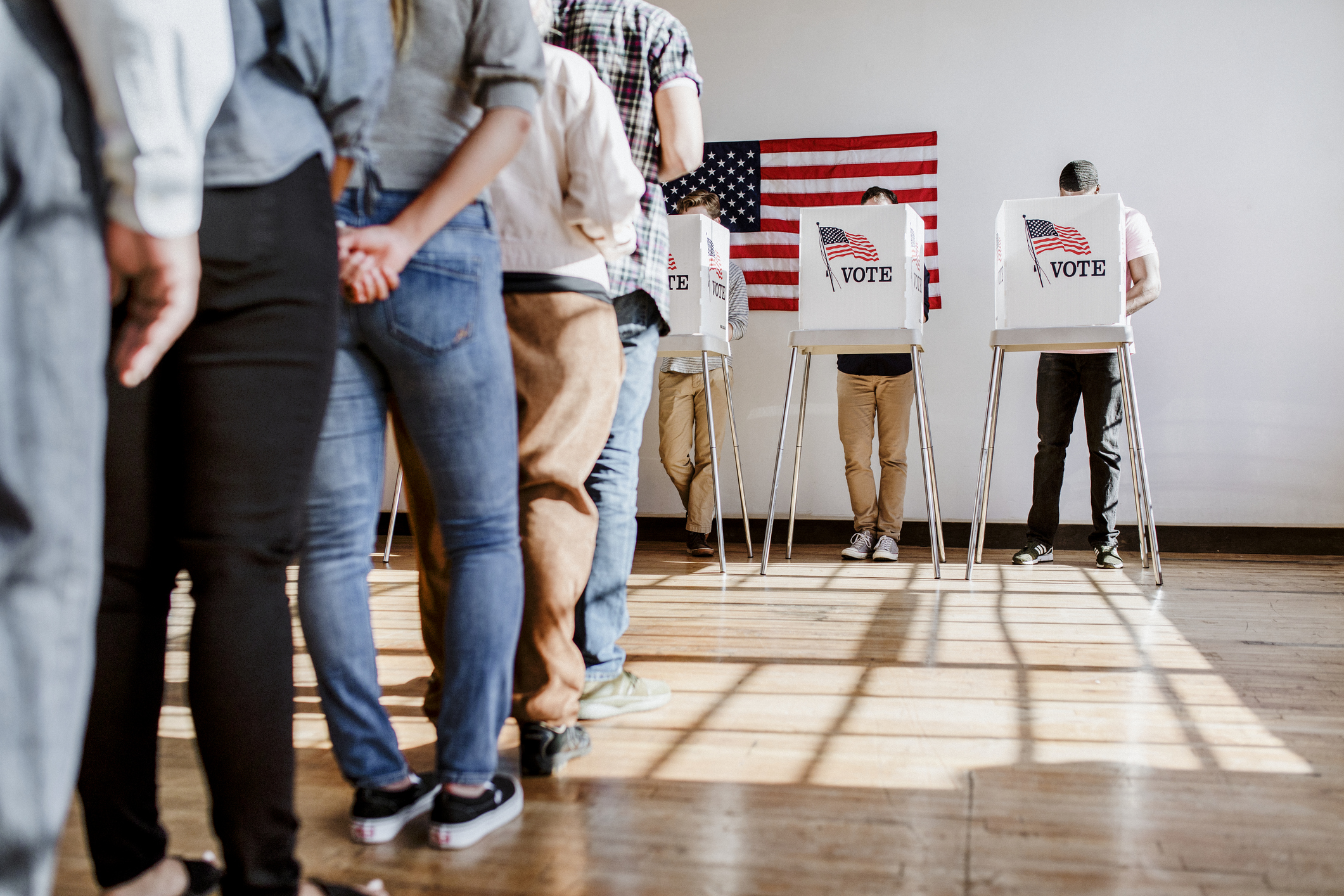Governor L. Douglas Wilder’s contributions to history have left an indelible mark. From breaking barriers as the first African American elected governor in U.S. history to his tireless advocacy for equity and justice, his legacy has shaped generations. Now, a new initiative is ensuring that his impact is not just remembered — but actively explored and studied.
On Jan. 17, in celebration of Wilder’s 94th birthday, the Governor L. Douglas Wilder Library and Digital Collection was officially launched, marking a major step in preserving and expanding access to his historic contributions. The project is a collaborative effort between the Virginia Union University (VUU) L. Douglas Wilder Library and Learning Resource Center and the Research Institute for Social Equity (RISE) at the L. Douglas Wilder School of Government and Public Affairs at Virginia Commonwealth University.
Nakeina Douglas-Glenn, Ph.D., director of RISE, led the digitization process, ensuring that Wilder’s archives would be accessible to scholars, students and the public for years to come.
A vision for preservation and access
The digital collection serves as both a historical archive and an educational resource. “This initiative not only preserves history but also inspires future generations by showcasing the extraordinary life and work of Governor Wilder. His legacy is a testament to courage, leadership and a lifelong commitment to equity and justice,” Douglas-Glenn says.
The dual-platform approach ensures that Wilder’s story is both deeply researched and widely accessible. “The mission of the library is to support research, promote equity-focused policy and educate future leaders,” Douglas Glenn says.
Susan Gooden, Ph.D., dean of the Wilder School, highlights the collaborative effort behind the initiative. “This project is a powerful example of how institutions can work together to not only preserve history but also expand its reach,” Gooden says.
“By bringing Wilder’s archives into the digital space, we are ensuring that his vision and leadership are not just remembered but actively studied, debated and applied by scholars, students and policymakers across the globe.”
– Susan Gooden, dean of the Wilder School
The force behind the idea
The idea for the digital collection was the brainchild of Ameta Cartwright, director of the L. Douglas Wilder Collection at VUU. For years, she has worked to document and curate the governor’s letters, speeches, photographs and memorabilia — an archive that offers a personal look at his leadership. But one challenge remained: access.
“We learned during COVID that if something isn’t online, it may as well not exist,” Cartwright says. “We had scholars from England, China and Africa reaching out to access Governor Wilder’s papers, but they couldn’t get to them. Even people in Washington, D.C., had difficulty. Having the Governor’s archives digitized changes everything to foster equitable access for all.”
What stands out to Cartwright the most? Not the legislative reports. Not the policy memos.
It’s the letters and speeches.
“A lot of people don’t realize that Governor Wilder writes all of his own speeches and letters — even today,” she says. “Whether it’s a commencement speech, a student looking for advice or a world leader reaching out, his words show the depth of his leadership and the personal touch he brings to everything he does.”
The challenge of curation
Bringing the Governor Wilder Collection to life was no small feat. The effort required scouring hundreds of artifacts — including speeches, letters, photographs and government documents — to determine how best to categorize and digitally archive them for future generations. Every item had to be carefully reviewed, indexed and digitized to ensure it could be easily accessed and studied by scholars, students and the public.
“We’ve cast a wide net, scanning everything from speeches and thank-you letters to photographs and newspaper clippings — anything that could provide insight into Governor Wilder’s leadership.”
– Nakeina Douglas-Glenn, director of RISE
The VUU Collection covers Governor Wilder’s civic, military and political career from the late 1950s through 2009. It includes a vast array of materials — papers, photographs, negatives, audio cassettes, video tapes, awards and memorabilia — documenting his decades of public service. Wilder, who graduated from VUU in 1951 with a Bachelor of Science in chemistry, has long credited the university for shaping his early path.
Collaboration with VUU was crucial to making the project a success. Selicia Gregory Allen, archivist and special collections librarian, played a key role in organizing and cataloging the materials, ensuring they were carefully curated and digitized. Her expertise in archival preservation and classification was instrumental in shaping how Wilder’s legacy is presented.
Bridging the past and the future
One of the most powerful aspects of the digital collection is how it reflects the themes that defined Wilder’s leadership: courage, equity and justice. “When you listen to him talk, when you read these documents, you realize the courage it took for him to lead,” Douglas-Glenn says. “Traveling across Virginia — sometimes to places that may not have been immediately welcoming — required an incredible belief in people’s shared humanity.”
The project’s next phase includes curriculum guides and research templates, allowing students and scholars to explore Wilder’s policy initiatives in greater depth. “We’re also thinking about how to make this experience more interactive — potentially incorporating AI or immersive storytelling in the future,” Douglas-Glenn says.
“Right now, the exhibit space is filled with photos — but without a narrative. Visitors see renowned images, but they don’t always know the context, which is crucial to teaching history.”
– Ameta Cartwright, director of the L. Douglas Wilder Collection at Virginia Union University
A lasting impact
The Governor L. Douglas Wilder Library and Digital Collection ensures that Wilder’s legacy is not just remembered but actively studied, analyzed and appreciated. It is a living resource, evolving with new research and expanding its reach. Douglas-Glenn sums it up perfectly: “This isn’t just about Governor Wilder’s story — it’s about making sure that generations from now, people still have access to the lessons of his leadership. His legacy shouldn’t be unique, and yet it remains rare. Our work ensures that his impact continues to inform and inspire the future.” For those eager to explore the collection, the Governor L. Douglas Wilder Library and Digital Collection is now live at the archives, wilderlibrary.com, offering a window into history and a bridge to the future.
This story originally appeared in the Wilder School in Action magazine.
 Governor Wilder addresses a crowd during his 94th birthday celebration.
Governor Wilder addresses a crowd during his 94th birthday celebration.



.jpg)